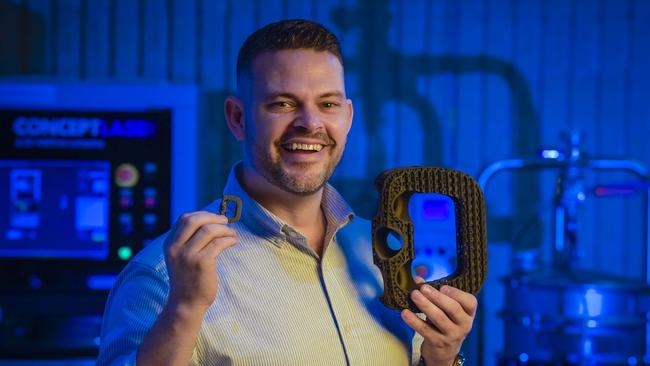Additive Surgical calls for regulator to back home grown innovators
The Therapeutic Goods Administration is not ushering home grown technology to the front of the regulatory queue, Additive Surgical says, putting millions in revenue on hold.

Additive Surgical is the definition of a homegrown manufacturing success story, with its 3D printed titanium spinal implants already cracking major export markets, novel intellectual property developed in concert with the nation’s best surgeons, and millions of dollars worth of Australian orders on its books.
There’s just one problem - it can’t sell anything in Australia because of a bureaucratic quirk which means local medical device manufacturing companies do not get fast-tracked through the regulatory process, meaning delays of months or even years to get on the shelf.
It’s a bone of contention with chief executive Gibran Maher, who co-founded the company alongside Chris Henry in 2020, seeking to develop a locally-made alternative to imported spinal implants.
Additive Surgical has developed a range of spinal implants in collaboration with surgeons across Australia, which have differentiated qualities such as a mesh structure which promotes better bone growth, and implants which are adjustable in-situ.
The company 3D prints the implants at its Adelaide site, where it is co-located with other med-tech manufacturing businesses.
“We’ve been working with the best bone surgeons in Australia to develop the next generation of spine implants to manufacture here in Australia, hold the intellectual property here in Australia, and export globally,’’ Mr Maher said.
The Additive Surgical implants have particular advantages which derive from the lattice structures the company has designed, which have specific micro and macro porosity characteristics.
“We’ve got differentiated lattices that combine into the one implant, whereas 90 per cent of other spine technologies have just one isometric lattice,’’ Mr Maher said.
“We’ve got these distinct lattices to address different clinical concerns of spine surgery, as voiced by our key opinion leader advisory group.’’
But while the company was able to quickly get sales approval in New Zealand, for example, in Australia it has been a different story.
Mr Maher said while in other developed countries local manufacturers are put to the front of the queue when it comes to getting the necessary approvals, the Therapeutic Goods Administration in Australia gives local manufacturers no such treatment.
“Unfortunately in Australia, it doesn’t seem like we have the foresight or resourcing within our regulator to give an expedited pathway for local manufacturers,’’ Mr Maher said.
“So it’s okay to submit an application but what are the timelines? It might be it might be eight months, it might be 14 months or even longer?’.
“Whereas if we were doing this exact same thing in Brazil, their regulator, ANVISA have a published policy called the ANVISA Innovation Policy where they say, if this is Brazilian IP and you’re manufacturing it locally we will work with you to get your approval here as soon as possible.’’
Mr Maher said his company had north of $2m worth of stocking orders ready to go once the Australian approvals came through, and then likely recurring revenue from those deals.
This revenue could then be ploughed back into further research and development, with the company also working in areas such as foot and ankle and cranial implants.
“It’d be a cascading domino effect,’’ Mr Maher said.
“We’ve got a really strong market and brand presence here in Australia, we’ve got a clinical advisory group here in Australia that’s exceptionally talented.
“So if we could get our products approved faster here in Australia, we would have significant revenues coming in and it would really turbocharge our export and development capability.
“And then we would start working on other products. So this is just a spine range. We’ve got IP coming up now for our surgical implants, foot and ankle, cranial, maxillofacial, all these other surgical implants that would then come under the Additive Surgical banner.’’
In terms of changes to the Australian system, Mr Maher said it could be as easy as pushing local manufacturers of medical devices to the front of the queue.
There was also the risk, he said, that companies which were deciding where to base their operations, might seek out jurisdictions where the process is expedited, in order to get to market more rapidly.
That could result in the unfortunate situation where Australian companies chose to base themselves offshore and import back into the country, rather than keep their manufacturing here.
As well as the benefits to his business from getting the products to market, there was also the undeniable benefit of providing better outcomes for patients.
“The end goal that we’re all aiming for is to have the very best possible patient outcomes and that’s why we’ve spent two years in deep research and development not just making a ‘me too’ product, but making something truly unique,’’ Mr Maher said.
“That is aimed at giving the best possible patient outcomes and for Australians to have access to that first - wouldn’t that be brilliant?
“It would be amazing to be able to work closely with our regulator to pilot or launch an expedited pathway for medical device conformity assessment for local manufactures.”
The federal Department of Health and Aged Care told The Australian that in 2022-23 “the median completion time for TGA conformity assessment was 10 months and all applications were completed in less than the statutory time of 12 months’’.
“The TGA undertakes extensive education and engagement activities with Australian manufacturers and sponsors to facilitate faster approval processes.
“The TGA provides the same assessment and approval services for Australian manufacturers and Australian importers (sponsors) seeking to provide new health technology to improve the health and wellbeing of Australians.
“The TGA needs to ensure that companies are treated fairly regardless of where the product is made and that we do not introduce anti-competitive policies.’’




To join the conversation, please log in. Don't have an account? Register
Join the conversation, you are commenting as Logout